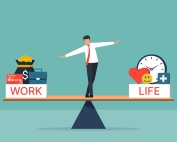Quality of Life
You can thrive and enjoy life even though you have kidney disease. Look at the ways you can help determine how you view your life going forward. Determine if employment works for you as well as the benefits of staying active, your mental health, and staying socially connected with others.
Contents:
 Employment and having a career are often major events in our lives. As children, we talk about what we want to be when we grow up. As adults, asking about where we work or what we do for a living are ice breakers when meeting new people. Friends often discuss the good and the bad aspects of their jobs. Having a job provides financial support, possibly health insurance, emotional support and gives us a sense of purpose. We often feel good about what we do, the friends and colleagues with whom we interact, and the success and accomplishments we achieve. For many of us, our jobs define a part of us.
Employment and having a career are often major events in our lives. As children, we talk about what we want to be when we grow up. As adults, asking about where we work or what we do for a living are ice breakers when meeting new people. Friends often discuss the good and the bad aspects of their jobs. Having a job provides financial support, possibly health insurance, emotional support and gives us a sense of purpose. We often feel good about what we do, the friends and colleagues with whom we interact, and the success and accomplishments we achieve. For many of us, our jobs define a part of us.

So, when people find they have a chronic illness, feel too sick to work, and have used all of their sick days and available time off, they wonder what to do about their jobs. Sometimes the doctors and health care team will suggest that someone with End-Stage Renal Disease (ESRD) quit work, which only adds to the dilemma of what to do. People in the later stages of Chronic Kidney Disease (CKD) and those with ESRD may feel so sick and weak that they feel they have no options but to quit work. Their energy levels are low, they are dealing with the reality of having a chronic illness, and they might feel an array of emotions such as sadness, anger, anxiety, and depression. It is important to learn about how to live well with kidney disease, both physically and mentally.
But now may NOT be the time to quit work. It always seems to be harder to find another job, and people often start to feel better after they adjust to the diagnosis of CKD, start dialysis, adjust to their medications, and/or have a kidney transplant. Try to give yourself the time you need so that you can make an informed decision that is right for you. You may have more options than you know. Once you feel better, you will be better able to make a decision based on your physical health, mental health, finances, and quality of life, The article “Keeping Your Job When You Need Dialysis” will give you tips on what you can do, as well as how to make treatment and dialysis work together.
Talking to Your Empoyer

You may want to talk to your employer about having chronic kidney disease, especially if you will need to take time off, adjust your job duties, or need special accommodations. It’s better to make an appointment for this discussion and not just bring it up in the hallway or interrupt your boss at an inappropriate time. It will be helpful to share information about the disease, the treatment, and what it means regarding your work. Many employers don’t know anything about CKD, and you will want to educate them and clear up any misconceptions. If you need to take time off or adjust your schedule, you will need to discuss this in detail.
Vocational Rehab
 Vocational rehabilitation (VR), a state-supported service, helps with employment services, such as resume writing, job seeking and similar services for people with disabilities. Some people with kidney disease would like to continue to work in their previous job, but due to its physical demands are no longer able to do so. Vocational rehabilitation offers the opportunity to test for other interests and provides job training or educational opportunities for positions that may be more suitable.
Vocational rehabilitation (VR), a state-supported service, helps with employment services, such as resume writing, job seeking and similar services for people with disabilities. Some people with kidney disease would like to continue to work in their previous job, but due to its physical demands are no longer able to do so. Vocational rehabilitation offers the opportunity to test for other interests and provides job training or educational opportunities for positions that may be more suitable.
A list of State VR agencies can be found at: https://askjan.org/concerns/State-Vocational-Rehabilitation-Agencies.cfm
The Family and Medical Leave Act (FMLA) / Disability
 The Family and Medical Leave Act (FMLA) makes it possible for eligible employees of covered employers to take unpaid 12 workweeks of leave in a 12-month period that protects their jobs. One of the reasons for taking FMLA includes a serious health condition that makes one unable to perform their job duties. You must be employed for at least 12 months and work for at least 1,250 hours during the 12-month period before requesting FMLA. There are certain eligibility requirements for the employer as well as the employee, such as having at least 50 employees. For more information go to https://www.dol.gov/agencies/whd/fmla. ) Or call the toll-free information and helpline, available 8 a.m. to 5 p.m. in your time zone, 1-866-4-USWAGE (1-866-487-9243).
The Family and Medical Leave Act (FMLA) makes it possible for eligible employees of covered employers to take unpaid 12 workweeks of leave in a 12-month period that protects their jobs. One of the reasons for taking FMLA includes a serious health condition that makes one unable to perform their job duties. You must be employed for at least 12 months and work for at least 1,250 hours during the 12-month period before requesting FMLA. There are certain eligibility requirements for the employer as well as the employee, such as having at least 50 employees. For more information go to https://www.dol.gov/agencies/whd/fmla. ) Or call the toll-free information and helpline, available 8 a.m. to 5 p.m. in your time zone, 1-866-4-USWAGE (1-866-487-9243).
Barriers to Employment
You often hear statistics about the unemployment rate as an indicator of the overall health of the economy. However, it is important to understand the factors that impact an individual’s ability to become and remain employed. Researchers from Baylor University are attempting to highlight how difficult it is for ESRD patients to find, or maintain their employment once they are on dialysis. One key finding from their study showed more than three quarters of patients were not working by the time they started dialysis and about a third of patients who were employed six months prior to dialysis had stopped working by time they started dialysis. These findings suggest the need for more resources and intervention on employment before individuals progress to ESRD.
Social Security
Many people with CKD/ESRD may find that after trying to continue to work or after weighing the issues of their own situation, that employment is no longer an option. There may need to be physical and emotional adjustments to that decision. Sometimes there is a role reversal in the family regarding who is the primary worker outside of the home and who is the primary worker inside of the home. This also may involve some adjustments on the part of both spouses or partners and communication will be key. Private counseling or assistance from a dialysis social worker may be helpful too. The article on role reversal, written years ago by a patient who provided tips to make it work, is still timely today. You can read it at http://kidneypatientnews.org/quality/resources/tibble_reprint2003.pdf
The Social Security Office aids people who are disabled and meet certain guidelines. Go to https://www.ssa.gov/disabilityssi/ for more information.
The Americans with Disabilities Act (ADA)

The Americans With Disabilities Act (ADA) of 1990 makes it illegal for businesses with more than 15 people to discriminate against employees with chronic kidney disease. Employers also may need to make accommodations for some people with CKD who need assistance. You can go to https://askjan.org/disabilities/Renal-Kidney-Disease.cfm for ideas that would support people with kidney disease to continue working. The Job Accommodation Network (JAN) also answers questions about the ADA at https://askjan.org/articles/The-Americans-with-Disabilities-Act-A-Brief-Overview.cfm.
Ticket to Work (TTW) and Self Sufficiency Program

This is a free, federally-funded employment program through Social Security for people between the ages of 18-64, who are on Social Security Disability (SSD). It provides support to enter or re-enter the workforce. Services may include job coaching, benefits counseling, training and job assistance. Their help line is 1-866-968-7842 or 866-833-2967 (TTY) Monday – Friday 8 am – 8 pm. https://choosework.ssa.gov/
Information about the Trial Work Period & Other Work Incentives: https://www.ssa.gov/OACT/COLA/sga.html
Additional Resources
Can I Work After Kidney Failure?
Information about applying for disability if needed
https://www.disabilitybenefitscenter.org/disability-work/kidney-failure
CareerOneStop
Sponsored by the U.S. Department of Labor, this site provides information about career exploration, training, resumes, interviews and jobs.
www.careeronestop.org
Job Accommodation Network (JAN)
Answers questions about workplace accommodations and/or the ADA
https://askjan.org/
Keeping Your Job When You Need Dialysis
Suggestions for ways to keep your job when diagnosed with CKD and it explores various ESRD treatment methods that support working.
http://www.homedialysis.org/life-at-home/articles/keeping-your-job-when-you-need-dialysis
KidneyWorks
A job retention program for people with Chronic Kidney Disease (CKD)
https://www.kidneyworks.org/
New Wage Reporting Application
For those who are on SSDI and work, online reporting now available.
https://blog.socialsecurity.gov/new-wage-reporting-application/
Role Reversal
Witten by a kidney patient years ago, the tips and messages still hold true today
http://kidneypatientnews.org/quality/resources/tibble_reprint2003.pdf
Self-Employment and Entrepreneurship
Resources to explore self- employment and its flexibility
https://www.dol.gov/odep/topics/SelfEmploymentEntrepreneurship.htm
Social Security
Web site provides information about Social Security and signing up for it as well as related podcasts, webinars, booklets, and calculators.
https://www.ssa.gov/
The Red Book – A Guide to Work Incentives
A Summary Guide To Employment Supports For Persons With Disabilities Under The Social Security Disability Insurance (SSDI) And Supplemental Security Income (SSI) Programs
https://www.ssa.gov/redbook/index.html
These Companies Have Remote Jobs That May Be Great for People with Chronic Illnesses or Disabilities
Some of these companies have a variety of jobs that may have a limited work span. Others look for those who can work at various hours from home.
https://themighty.com/2017/07/remote-jobs-companies-disability/
Working While Disabled: How Can We Help
Work incentive programs
https://www.ssa.gov/pubs/EN-05-10095.pdf













